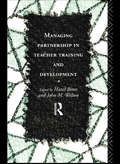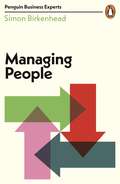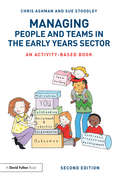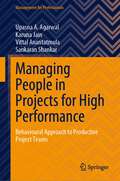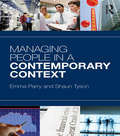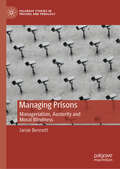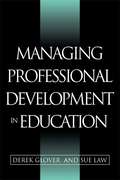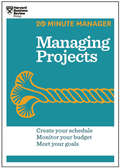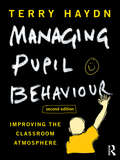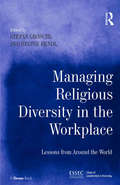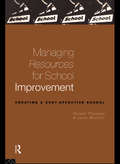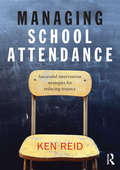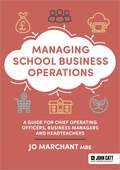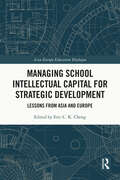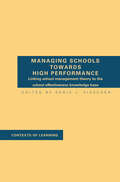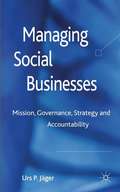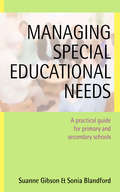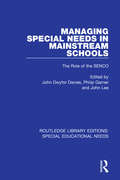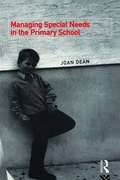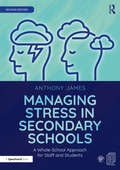- Table View
- List View
Managing Partnership in Teacher Training and Development
by John Welton Hazel BinesThe trend towards partnership between higher education and other education providers is a dominant theme of 1990s education. Political attention has focused on initial teacher training, but in this book, the authors argue for a policy of professional development which links initial teacher education, continuing professional development, and research. Written by experienced teachers and teacher educators, this book examines current practice and discusses the policy and practical management issues which need to be addressed in planning and managing career-long teacher education, development and research within a partnership framework.
Managing People (Penguin Business Experts Series)
by Simon BirkenheadBecoming a manager is not a progression in your career, it's a move into an entirely new job, one that requires a unique set of skills. Get it right and you'll inspire your team to deliver outstanding results. But get it wrong and you'll create stress, apathy and dysfunction in your team.Penguin Business Expert Simon Birkenhead has been guiding first-time and established managers for over two decades, helping them implement his blueprint for success. Here he reveals his framework that clearly explains what you must do for your employees to be the best they possibly can. Learn how to:- Activate motivation - Set clear expectations - Provide effective feedback - Master your communication skills- Build a high-performance team cultureManaging People is your complete guide to becoming a truly great manager for whom people want to do their best work.
Managing People and Teams in the Early Years Sector: An activity-based book
by Chris Ashman Sue StoodleyAiming to make Early Years management ideas easy to grasp, this series breaks down the jargon and provides accessible practical advice. As the role of a manager in Early Years becomes ever more complex and demanding, leaders must try to adapt and respond to the different pressures that constantly bombard them. Managing People and Teams in the Early Years Sector: An activity-based book helps managers and aspiring managers to explore a range of ideas and approaches to aid continued development in management skills and leadership and combat those pressures. Chris Ashman and Sue Stoodly challenge readers to develop their own views whilst learning about management theory and practice alongside the 2015 Ofsted Common Inspection and Leadership & Management frameworks. Combining clear explanations of management and leadership theories with practical guidance on every aspect of managing people from support and appraisal to safer recruitment and induction, the book features: Scenarios for reflective practice Activities to stimulate thinking and help you apply the ideas to your own experience Figures and diagrams to exemplify key points, ‘Management Health Warnings’ to highlight key messages This fully updated second edition is essential reading for those new to management or looking to develop their career into a managerial role and students working towards level 3 qualifications or a Foundation Degree.
Managing People in Projects for High Performance: Behavioural Approach to Productive Project Teams (Management for Professionals)
by Upasna A. Agarwal Karuna Jain Vittal Anantatmula Sankaran ShankarThis book examines practically useful management and people skills, and looks at competencies from the micro, meso, and macro- lens. At the micro- level, the book examines a range of competencies needed for managing oneself and others in a project environment, such as personality style, cognitive skills, communication skills, and emotional intelligence. The book will also includes discussion on strategies for managing emotions of self and others effectively. At the meso- level, the book discusses basic structure, characteristics, and importance of different types of teams such as virtual teams, project teams, domain specific teams, and heavy-weight teams in organizations to enhance productivity and delegate accountability. It also explores team processes, including structure, culture, supporting systems, performance and incentive systems, and their impact on team productivity. In addition, the book includes a discourse on skills to manage a multi-generational workforce (a combination of baby boomers, X and Y generation), a challenge faced by project managers in current scenario. Finally, at the macro- level, the book captures the role of culture in a project context; emerging leadership styles in projects, maintaining relationship with internal and external stakeholders; role of power, politics and influence in relationship building (social networks and social capital); and managing conflicts and negotiations. The book presents ethical considerations in managing projects; relationship between projects and sustainability; societal responsibilities of projects; advantages and disadvantages of forms of control in projects (behaviour and outcome control). It is positioned primarily for practitioners although it is a relevant and useful resource and reference for academics and students of project management and management studies courses.
Managing People in a Contemporary Context
by Shaun Tyson Emma ParryThe worldwide financial crash and the ensuing recession have coincided with other significant long term changes for the Western Economies of Europe and the USA, especially the growing strength of newly developed economies, demographic and technological change, institutional crises and political uncertainty. The interconnected nature of businesses and societies mean the competitive landscape is being transformed, and new economic pressures and opportunities are producing new business models, a rebalancing of economies, and a new HRM. The application of new technology to the processes and systems of people management is spreading, in a world where competitive advantage is increasingly about how smart the management processes are, and how well people are managed. This text is the first book to analyse the way these contextual pressures are producing a game change in the human resource function of management. For anyone who has an HR role or is a line manager, or a student of management, and for those who teach, research or consult in the field, this book encapsulates these critically important trends and what they mean for managing people in the 21st Century.
Managing Prisons: Managerialism, Austerity and Moral Blindness (Palgrave Studies in Prisons and Penology)
by Jamie BennettThis book critiques the practices of managerialism and their effects on those who live and work in prisons. It draws upon ethnographic research conducted in English prisons over a 15 year period, written by a former prison governor. Since the last years of the 20th century, public services in England have increasingly adopted managerial approaches with an architecture of target setting, surveillance and assertive line management. The book examines how this system was created and then evolved during the period of austerity after 2010 and was disrupted during the coronavirus pandemic of 2020-22. It proposes an alternative approach, re-energising the agency of prison managers, reinvigorating a more localised approach, and developing measures that address the lived experience of people in prison. This book will be of particular relevance to prison managers and policy makers, researchers interested in criminology, the sociology of prisons, and the sociology of work, as well as to post-graduate students exploring prison work.
Managing Professional Development in Education
by Sue Law Derek GloverThis work evaluates and attempts to produce a model for effective professional development. It contrasts the work in Britain with that in other countries, with case studies and exercises to illustrate points, highlighting good practice.
Managing Professional Development in Schools
by Sonia BlandfordThe importance of professional development for teachers cannot be overstated. In recent years there has been much debate on how to raise standards in schools and it is now recognised by theorists, policy-makers and practitioners that the professional development of teachers is an important factor in this context.For professional development co-ordinators and senior management, knowledge and understanding of the nature of professional development roles and human resource management theories will provide a framework for practice.This book includes chapters on:*managing professional development in a human resources context*government policy*initial teacher training*the school development plan*appraisal*middle management*leadership skills.It will be of interest to co-ordinators of professional development in schools and across local education authorities, and to anyone who is part of a school's senior management team.
Managing Projects (20-Minute Manager Series)
by Harvard Business ReviewYou've been asked to manage a key project-or perhaps you've volunteered for an assignment that could advance your career. So how do you make sure the project succeeds? Managing Projects walks you quickly through the basics, including: Drawing up a realistic schedule and project plan Monitoring key tasks and benchmarks Communicating with stakeholders Bringing the project to a closeAbout HBR's 20-Minute Manager Series:Don't have much time? Get up to speed fast on the most essential business skills with HBR's 20-Minute Manager series. Whether you need a crash course or a brief refresher, each book in the series is a concise, practical primer that will help you brush up on a key management topic.Advice you can quickly read and apply, for ambitious professionals and aspiring executives-from the most trusted source in business. Also available as an ebook.
Managing Pupil Behaviour: Improving the classroom atmosphere
by Terry HaydnWhy are some teachers and student teachers better at managing pupil behaviour than others? What are the factors which make a difference to classroom climate? Can any teacher or student teacher become accomplished at managing pupil behaviour? Managing Pupil Behaviour provides routes through the classroom management maze to help practising and aspiring teachers learn to manage behaviour effectively in their classrooms. Using a unique 10-point scale, it encourages teachers to think about the degree to which they are relaxed and in assured control of their classrooms and can enjoy their teaching. Drawing on the views of over 140 teachers and 700 pupils, it provides insights into the factors which enable teachers to manage learning effectively in their classrooms, so that pupils can learn and achieve, and teachers can enjoy their work. Key issues explored include the factors that influence the working atmosphere in the classroom, the impact of that atmosphere on teaching and learning, and tensions around inclusive practice and situations where some pupils may be spoiling the learning of others. This new edition has been fully updated to take account of recent research and inspection findings and includes a new chapter exploring the wide range of sophisticated skills that expert teachers deploy in order to get pupils to want to learn, and to enable teachers to work in classrooms where the climate is perfect for learning. Managing Pupil Behaviour will help all teachers ensure ‘the right to learn’ for all the pupils in their care and to think about different ways to approach this vitally important aspect of their working lives.
Managing Reform in Universities: The Dynamics of Culture, Identity and Organizational Change (Issues in Higher Education)
by Cláudia S. Sarrico Jussi Välimaa Bjørn StensakerThis collection, now in paperback, explores how universities are coping with the range of reforms and changes taking place across higher education today. Analyzing areas such as leadership, quality management, strategic thinking, collegiality and academic work, and from the perspective of different agents within higher education including students, academics and management, this book examines the various differences between reform attempts and the actual changes happening in universities.
Managing Religious Diversity in the Workplace: Examples from Around the World
by Stefan Gröschl Regine BendlMany observers propose the exclusion of all religious related aspects from organizational life, others promote a more tolerant approach of certain practices, symbols and ceremonies, and few commentators highlight the values, diverse religious beliefs and experiences that employees could bring to the organization. Arguments, conclusions and recommendations are often contradictory and inconclusive due to the complexity and dividing nature of religion diversity. In Managing Religious Diversity in the Workplace the editors present a selection of essays, conceptual papers, empirical studies and case studies about how religious diversity and spirituality are managed. The book explores how firms address organizational and managerial challenges deriving from the religion diverse backgrounds of their employees. The different contributions discuss policies and practices, how implicit and unmarked religious norms influence the ’managing’ of religious issues in organizations, and what the benefits of a religion diverse workforce are. It also includes contributions which address aspects of spirituality in the workplace, and the role of legal frameworks and their influence on organizations and their policies and practices regarding religion diversity. The perspectives and contributions include a wide range of disciplines by authors from leading academic institutions around the world.
Managing Resources for School Improvement: Creating A Cost-effective School
by Jane Martin Jane Martin Nfa Hywel ThomasFirst Published in 2004. Routledge is an imprint of Taylor & Francis, an informa company.
Managing Risk in High-Stakes Faculty Employment Decisions
by Terry L. Leap Julee T. FloodUnderstanding the risks involved in hiring new faculty is becoming increasingly important. In Managing Risk in High-Stakes Faculty Employment Decisions Julee T. Flood and Terry Leap critically examine the landscape of US institutions of higher learning and the legal and human resource management practices pertinent to college and university faculty members. To help minimize the potential pitfalls in the hiring and promotion processes, Flood and Leap suggest ways that risk management principles can be applied within the unique culture of academia.Claims of workplace harassment and discrimination, violation of free speech and other First Amendment rights, social movements decrying unequal hiring practices, and the growing number of non-tenure track and adjunct faculty, require those involved in hiring and promotion decisions to be more knowledgeable about contract law, best practices in hiring, and risk management, yet many newly appointed administrators are often not sufficiently trained in these matters or in understanding how they might be applied in an academic setting. Human resource departments, hiring committees, department chairs, and academics seeking faculty jobs need resources such as Managing Risk in High-Stakes Faculty Employment Decisions now more than ever. Outlines critical issues affecting U.S. higher education Analyzes the social and psychological biases that can arise during hiring, promotion, and tenure decisions Discusses contract and constitutional law from the perspective of institutions of higher learning Illustrates complex interactions that shape contractual, constitutional, and collegial issues in institutions of higher learning Examines contract rights and controversies for tenured and tenure-track faculty Describes how risk management processes can help to deal with these complicated, but critical, issues Addresses constitutional issues associated with academic freedom and free speech on campus Investigates the nebulous, but important, issue of collegiality Discusses the future for institutions of higher learning in hiring faculty
Managing School Attendance: Successful intervention strategies for reducing truancy
by Ken ReidTeachers and governments all agree that if you wish to raise educational standards then it’s imperative to improve school attendance, and yet an average of around ten per cent of secondary pupils are missing school on a daily basis. Despite governments around the globe trying to address this situation, any improvements have been negligible and improvements in school attendance have been stubbornly hard to achieve. As an internationally recognised expert on this topic, Professor Ken Reid offers workable, practical solutions to help schools improve attendance and to reduce non-attendance and truancy at government level, school and local authority level, individual pupil level and at the family level. Underpinned by the very latest research, but expanded upon with an accessible, practitioner focus, the issues covered by this topical text include: The causes of non-attendance and truancy Successful interventions and the evidence from research Reflections on the attempts to find national solutions Implementing home-school solutions An agenda for the future Supporting throughout with case-studies and workable solutions to the most demanding of situations, this book will be essential reading for head teachers, deputy head teachers, teachers and any educational professional eager to raise standards for all.
Managing School Business Operations
by Jo MarchantThis easily accessible handbook explores why managing school business operations is important and how to write your business operations strategy. It covers the main business functions of finance, people, estates, health and safety, and IT, as well as other business areas including procurement, marketing and environmental sustainability.The book considers the roles and expertise required to manage school business operations effectively, as well as how to identify risks, business continuity, cybersecurity and data protection. The final section draws all these areas together, focusing on how to implement your business operations strategy effectively and the need for constant review.In Managing School Business Operations, Jo Marchant shares her significant experience and expertise as a school business leader. Readers responsible for leading business operations, whether as a school business manager or a chief operating officer, will find a wealth of information on the wide range of business functions and activities that schools now need to manage.
Managing School Business Operations
by Jo MarchantThis easily accessible handbook explores why managing school business operations is important and how to write your business operations strategy. It covers the main business functions of finance, people, estates, health and safety, and IT, as well as other business areas including procurement, marketing and environmental sustainability.The book considers the roles and expertise required to manage school business operations effectively, as well as how to identify risks, business continuity, cybersecurity and data protection. The final section draws all these areas together, focusing on how to implement your business operations strategy effectively and the need for constant review.In Managing School Business Operations, Jo Marchant shares her significant experience and expertise as a school business leader. Readers responsible for leading business operations, whether as a school business manager or a chief operating officer, will find a wealth of information on the wide range of business functions and activities that schools now need to manage.
Managing School Intellectual Capital for Strategic Development: Lessons from Asia and Europe (Asia-Europe Education Dialogue)
by Eric C. K. ChengCheng articulates the extent to which knowledge management approaches can create intellectual capital (IC) and contribute to improvements in education quality. He argues that public schools have long contended with the requirements of quality assurance in a competitive environment of decreasing student numbers, increasing parental choice and rising standards of accountability. As public organizations, schools have to demonstrate appropriate resource management and show evidence that they are meeting defined development plans and goals. Cheng proposes a strategic approach, Intellectual Capital management, to help schools respond to and cope with the increasingly competitive environment while enhancing school capacity for improving student learning. First, the book guides readers to understand the development of IC theory in the context of education to address the requirements of quality assurance and accountability. It then introduces Lesson Study, e-Learning and ICT as key resources and drivers for building school IC, and examines the organisational factors that enable knowledge management approaches for developing IC in schools from both Asia and Europe. It concludes by offering strategies and implementation methods to manage school IC for sustainable development. Combining research from Asia and Europe, this edited volume will be useful for school leaders and policy makers, as well as those researching school leadership and intellectual capital.
Managing Schools Towards High Performance (Contexts of Learning)
by Adrie J. VisscherThis text aims to connect school organization theory with the school effectiveness knowledge base. Each chapter presents a comprehensive overview of the knowledge base on the central theme and addresses the question of what is known about the subject as a school effectiveness-enhancing condition.
Managing Social Businesses
by Urs P. J�gerSocial businesses and non-profit organizations act at the interface of markets and civil societies. Their executives are challenged by issues of social mission and economic rationale. This book presents a new concept of social businesses and a framework for the mission and strategy-related decision making in this complex concept.
Managing Special Educational Needs: A Practical Guide for Primary and Secondary Schools
by Sonia Blandford Suanne Gibson'This is a most worthwhile book which contributes significantly to the general body of knowledge on managing pupils with special education needs. I found it interesting and informative. Schools cannot but benefit from the book's scope, and from insights into the many and varied aspects on SEN provision' - REACH `A particular strength of the book is the way in which individual chapters provided "self-contained" material which lends itself for use in school-based staff development activities. The book includes a lot of information that SENCOs, inclusion managers and members of school leadership teams should find useful' - SENCO Update `The strongest point about this book is that it gives a good overview of the history of special educational needs policy in this country, including recent development on inclusion' - TES Extra Special Needs 'It is a very practical account and should be a handbook for any newly appointed SENCO... [while] for experienced SENCOs and organisations where inclusion is not an issue, this book is a reminder of good practice' - Special Written from a practitioner's perspective, this book shows schools how to effectively implement and manage an inclusive school environment. Drawing from their experience in a range of schools, the authors highlight the problems encountered by professionals in both primary and secondary school settings and offer practical solutions and advice. The book offers guidance on: the role of the SENCO as a teacher and manager; government policy and legislation; self-evaluation, good practice and monitoring; how to relate SEN to school targets and development plans. Primary and secondary school teachers, headteachers, student teachers, SENCOs, LEA Advisers and professionals involved in the management of Special Educational Needs in schools will find the practical support offered in this book invaluable.
Managing Special Needs in Mainstream Schools: The Role of the SENCO (Routledge Library Editions: Special Educational Needs #14)
by John Lee Philip Garner John Dwyfor DaviesFirst published in 1998. The wide-ranging perspectives in this book will help key personnel in primary schools to manage the implantation of the 1993 Education Act and the Code of Practice on the Identification and Assessment of Special Educational Needs more effectively. Governors and headteachers comment on the management of resources and on interaction with parents and others outside the school. Researchers and academics provide an analysis of the impact and legal implications of the Code of Practice on primary schools. SENCOs offer insights into the development of whole-school and classroom practice, commenting on the practicalities of implementing the philosophy behind the Code of Practice.
Managing Special Needs in the Primary School (Educational Management Ser.)
by Mrs Joan DeanThe Code of Practice on the Identification and Assessment of Special Educational Needs has significantly changed the way in which schools assess and provide for pupils with special needs. The various chapters of the book cover: * recent legislation * the needs of children with different types of special needs * school policy and the whole school approach * approaches to the National Curriculum * possible ways of organising for special educational needs * the role of the special needs co-ordinator * the role of the class teacher * assessment and record keeping * working with parents * staff development * support services Written with the needs of primary school teachers and heads in mind, this book addresses the implications which the Code of Practice has for primary schools, focusing in particular on these issues from the management point of view.
Managing Staff in Early Years Settings
by Adrian Smith Ann LangstonThis book draws on a wide range of management theory and shows its relevance and relationship to early years settings. Case studies are used to provide the starting point for reflection, and throughout the chapters you are asked to consider the examples, stand back, interpret and audit your own actions in order to develop your management skills. This book will assist managers and prospective managers by providing them with the tools to facilitate staff training sessions or to conduct personal enquiry into the working of their own organization. Chapters cover: leadership and management teams and team building staff motivation managing change selecting suitable staff and effective interviewing staff assessment projecting and maintaining a positive image for your school or nursery managing conflict and stress.
Managing Stress in Secondary Schools: A Whole-School Approach for Staff and Students
by Anthony JamesManaging Stress in Secondary Schools: A Whole-School Approach for Staff and Students, second edition, introduces a practical stress management programme for use in schools and colleges. Drawing from current theory and evidence-based practice on anxiety, stress and mental health, it offers student lesson plans, plus a staff self-training session, with concrete activities to develop crucial stress management skills in both staff and students. The programme provides direct training in stress reduction skills, supported by online resources, designed to fit into timetabled PSHE lessons. Key features of this manual include: Simple and flexible lesson plans that can be performed either at the start of timetabled PSHE lessons or as full stress management lessons on their own. A staff self-training session plan that serves both as preparation for leading lessons with students and facilitates the development of stress management skills among staff. Downloadable audio relaxation recordings. Downloadable handouts to encourage students’ relaxation practice at home. Downloadable PowerPoint slides to guide tuition. With lessons covering the causes and effects, as well as strategies on preventing and managing stress, this is an invaluable resource for teachers and other school staff involved in the PSHE curriculum. It would be of particular interest to those supporting students preparing for exams.
